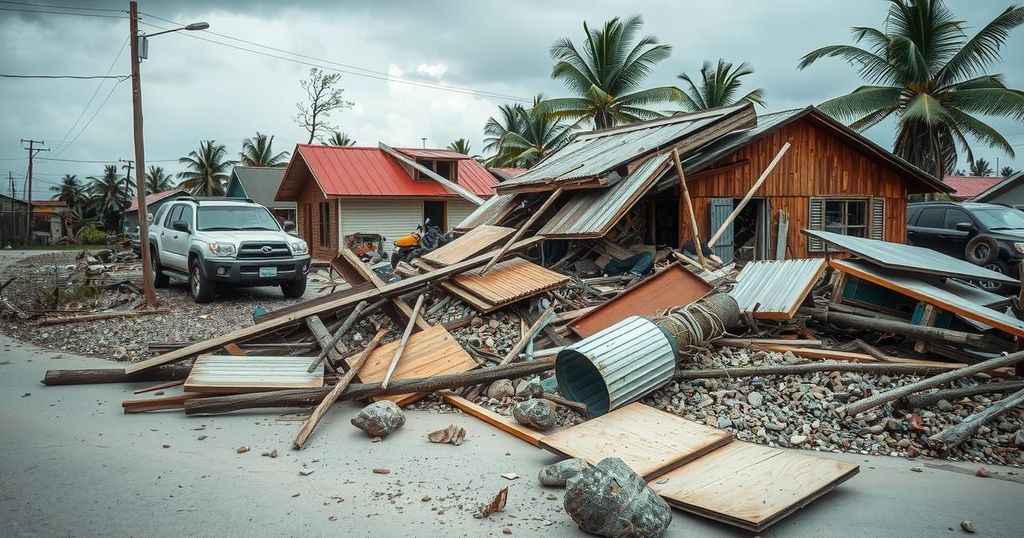Cyclone Chido Devastates Mozambique, UNHCR Responds to Humanitarian Crisis

Tropical Cyclone Chido has devastated northern Mozambique, displacing thousands and damaging vital infrastructure. UNHCR is providing essential humanitarian assistance, including emergency supplies, to those affected. Preliminary reports indicate around 190,000 people urgently need aid. The cyclone has severely impacted communities already vulnerable due to ongoing conflict and economic issues, raising concerns about further displacements and losses as the rainy season looms.
Tropical Cyclone Chido has wreaked havoc across northern Mozambique, particularly affecting the Cabo Delgado and Nampula provinces. Heavy rains and fierce winds resulted in significant damage to communities, leading to the destruction of homes, displacement of thousands, and debilitating impacts on road and communication infrastructures. UNHCR, the UN Refugee Agency, has expressed grave concern regarding the safety and well-being of these vulnerable populations and is partnering with the Mozambican government and humanitarian organizations to deliver crucial aid. Within 48 hours of the cyclone’s passage, UNHCR assisted over 2,600 individuals at a central accommodation site in Pemba, distributing vital supplies such as blankets, sleeping mats, mosquito nets, and emergency shelter materials.
While the comprehensive impact on rural regions is still being assessed, preliminary estimates indicate that approximately 190,000 individuals require immediate humanitarian support. Reports indicate that nearly 10,000 homes have been lost, and 33 educational institutions sustained damage. Many villages now face complete devastation, highlighting the compounded difficulties for families already grappling with years of conflict and economic challenges. For many displaced by the cyclone, their struggles have intensified, as the storm has obliterated their meager possessions that they had managed to restore.
In anticipation of Cyclone Chido, UNHCR had strategically positioned emergency supplies and collaborated with the government to disseminate disaster preparedness information throughout the affected regions. In the Nampula province, despite some districts being impacted, around 8,000 refugees at the Maratane camp faced minimal destruction, suggesting the success of recent measures aimed at building climate-resilient housing. Furthermore, Cyclone Chido caused severe damage in Mayotte, a French overseas territory, leading to destruction, fatalities, and heightened risks for vulnerable groups, including asylum seekers and refugees.
In southern Malawi, the cyclone’s effects included strong winds and rainfall that compromised homes and infrastructures. UNHCR had pre-deployed shelter kits to support the government-led response efforts. The agency is increasingly concerned that Cyclone Chido may indicate the commencement of a particularly harsh rainy season, historically associated with destructive cyclones and flooding, further jeopardizing displaced individuals and their host communities who are endeavoring to recover. The consequences of climate change disproportionately impact the most vulnerable groups, underscoring the urgent need for comprehensive support.
UNHCR remains steadfast in its commitment to aid affected populations in Mozambique and the surrounding region, collaborating closely with various government and humanitarian entities. However, with resources dwindling rapidly, the organization anticipates an increasing number of individuals will require urgent assistance in the forthcoming days.
Cyclone Chido, a recent tropical cyclone, has significantly impacted northern Mozambique, particularly the Cabo Delgado and Nampula provinces. These regions have long been beset by challenges, including conflict-related displacement and economic hardship, which have rendered communities significantly vulnerable to natural disasters. The cyclone’s destruction has compounded these existing struggles, leading to an urgent need for humanitarian assistance.
In summary, Cyclone Chido has caused widespread devastation in Mozambique, particularly affecting vulnerable communities that were already struggling with the repercussions of conflict and displacement. With thousands displaced and significant infrastructural damage, immediate humanitarian aid is urgently needed. UNHCR is actively working to provide necessary support, but the situation remains dire and resources are stretching thin as the rainy season progresses, threatening further displacement and losses.
Original Source: www.unhcr.org








